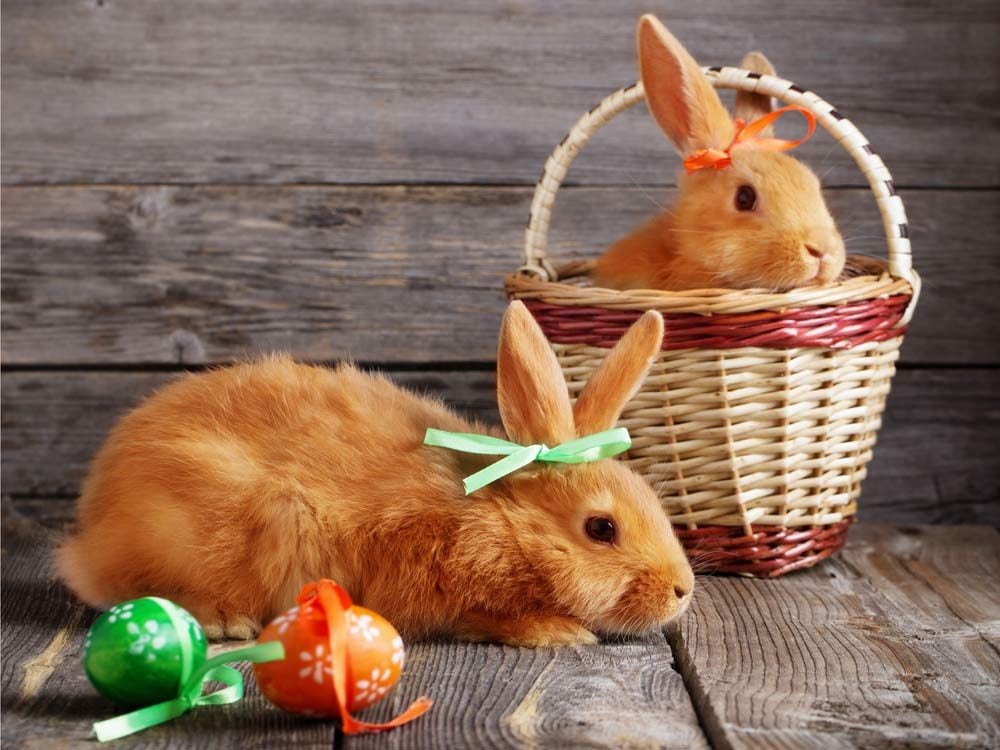The Real Reason Why Bunnies Are So Popular for Easter
The origins of the Easter Bunny are more mysterious than you think, and religion has nothing to do with it.

Why Are Easter Bunnies So Popular Anyway?
Who isn’t familiar with the origins of Bugs, Thumper, or Peter Cottontail? These famous bunnies are beloved characters from classic childhood cartoons, movies, and literature. But did you ever wonder how the most famous bunny of all, the Easter Bunny, became synonymous with a holiday commemorating the resurrection of Jesus?
While there isn’t any historical documentation that explains how a rabbit became the “furry” face of Easter, the most obvious connection may be the calendar. April showers not only brings spring flowers, but the birth of baby rabbits. Both springtime and bunnies are iconic symbols of birth and renewal. “Rabbits (originally hares) are longstanding fertility symbols associated with the arrival of spring, because they are so prolific and give birth as soon as the weather warms,” notes Diane Shane Fruchtman, PhD, Assistant Professor of Religion, Rutgers University, New Brunswick, New Jersey.
But according to Fruchtman, there’s no religious significance to a bunny being part of the Easter holiday. “The holiday of Easter is a celebration of the resurrection of Jesus who, according to the Gospels of Mark, Matthew, and Luke, celebrated the Jewish Passover holiday on a Thursday (the last supper was a Passover Seder, celebrating the Israelites’ exodus from Egypt), was crucified on a Friday, and rose from the dead on a Sunday, on the third day after his crucifixion.”
In fact, the Easter Egg has more historical context than the Easter Bunny in that eggs may have been part of the Passover Seder plate at the last supper, as it still is today. “We don’t know for sure, but later Jewish sources firmly incorporate the egg in the Passover ritual,” Dr. Fruchtman says, “though there are no bunnies to be found.”
The earliest reference to the Easter Bunny dates back to some time before the 17th century, when the Germanic people of Europe introduced the Osterhase—a rabbit, who brought gifts to children at Easter time. As History.com explains: When these Germanic immigrants settled in America in the 1700s they brought this tradition with them to Pennsylvania. The tradition even included children leaving carrots out for the Osterhase, much like leaving cookies for Santa at Christmas.
But there is another popular theory of where the Easter Bunny came from—the myth of Ostara. According to theconversation.com, the eighth-century scholar known as the Venerable Bede, in his work The Reckoning of Time, said that the word “Easter” stems from “Eostre” (another version of the name “Ostara”).
Fruchtman elaborates on this theory: “The seventh/eighth century English monk Bede says that the word comes from an Anglo-Saxon goddess, Eostre, whose feast-day in the spring coincided with the day of the Christian Paschal celebration. But no other source mentions Eostre, and it’s entirely possible that Bede made her up. But Bede makes no mention of rabbits or eggs being associated with her.”
Although the true origins of the Easter Bunny may never be fully known or agreed upon, the Easter Bunny and its sidekick, the Easter egg, continue to be much loved traditions of the Easter holiday. “Even if your typical Easter sermon won’t include anything about rabbits, eggs, or fertility, that’s not to say that the Easter Bunny and Easter eggs are not religious traditions,” says Fruchtman. “Religion is about far more than doctrine, texts, belief, and sacred buildings; it’s about practices, community, memory, family, home, and traditions that have meaning to you.”
It’ll be hard to find someone who will argue that finding a chocolate bunny in your Easter basket doesn’t put a spring (or hop) in your step whether you believe in the Easter Bunny or not.



